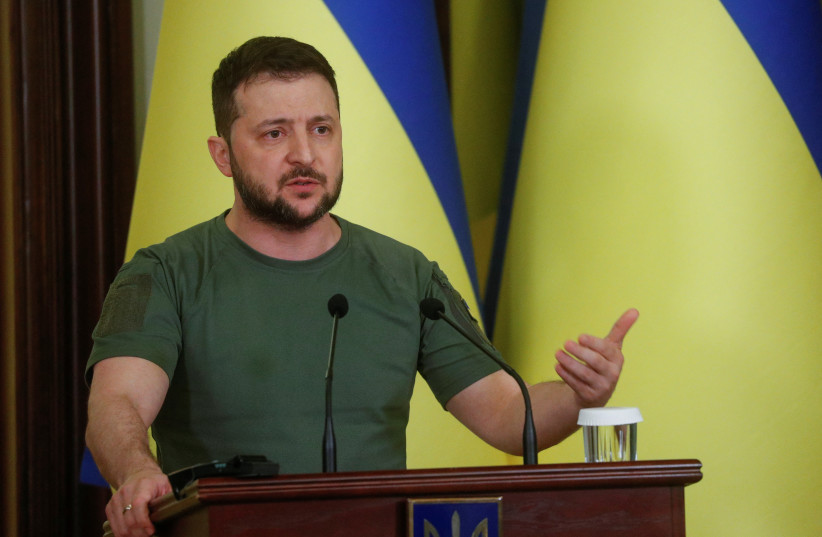Israel must stand with Ukraine against Russian, Iranian aggression - editorial
Israel must take the moral stand and support Ukraine, the victim of Russian – and Iranian – aggression, but it must be done with care.
Foreign Minister Eli Cohen visited Ukraine last week, sending a message that Israel stands with the country, which was invaded by Russia a year ago this week.
This important trip was the first by a senior Israeli official to the war-struck country since the start of the hostilities and marks an important change in stance.
When Russia invaded Ukraine last year, there were obvious reasons that Israel needed to take extra care in its response. The fact that Russia is firmly entrenched in Syria means that from a security point of view, Israel needs to be coordinated with Russia – Israeli-reported actions over Syrian airspace primarily aimed at preventing the transfer of Iranian arms to Hezbollah in Lebanon need to avoid accidentally hitting Russian assets or personnel and to ensure that Russia doesn’t fire on Israeli aircraft.
There was a genuine fear that with Russia on the border, taking an open stand in favor of Ukraine and supplying it with weapons could basically open a war front with Russian President Vladimir Putin.
The situation today is not the same, however. Putin clearly thought he would be able easily invade Ukraine, take over Kyiv, and remove Zelensky.

He was proven wrong.
Zelensky continues to hold out while Russia-Israel tensions rise
Zelensky and the Armed Forces of Ukraine and volunteers have put up a tremendous fight for their independence and freedom. Putin, fortunately, has not achieved his goal. It is unlikely that at this stage he would want to enter into a conflict with Israeli forces on a new front far from home when he is still struggling with the consequences of his aggression over the border in Europe. On the other hand, it is the nature of tyrants to act irrationally.
In addition, at the start of the war there was a great deal of concern that the large Jewish community in Russia could be held hostage by Putin if Israel acted in a way that he did not agree with.
Indeed, we have seen over the last year a move in Russia to halt the operations of the Jewish Agency that facilitate the immigration to Israel of those eligible under the Law of Return.
This is still a matter of concern but there is no doubt that a year on, most of the Jews in Russia (and Ukraine) who want to seek refuge in Israel have had the chance to do so.
As the one Jewish state, Israel must take the fate of the Jews in Russia into account, but it must also make sure it is doing the right thing.
Israel must do the right thing and support Ukraine
Israel has been supplying Ukraine with much needed humanitarian aid and has taken in large numbers of refugees – both Jews and non-Jews. It is also presumed to be supplying Ukraine with relevant intelligence.
But this is not enough as far as Zelensky is concerned. Early in the war, Ukraine appealed to Israel to supply it with its Iron Dome anti-missile system, and, on Friday, Zelensky told the Munich Security Conference that he is convinced that Israel will eventually provide Kyiv with the David’s Sling advanced anti-missile system.
Zelensky referred to lethal Iranian drones that have been used against Ukraine as well as Iran’s continued enrichment of uranium in its pursuit of building nuclear bombs, and made it clear that Iran is a common threat.
Zelensky’s requests for an advanced Israeli defense system present a challenge for Prime Minister Benjamin Netanyahu’s government. Netanyahu previously enjoyed a close relationship with the Russian leader, which helped Israel particularly in the Syrian sphere.
But there is no doubt that in the balance of things, Putin’s Russia is now firmly allied with Iran.
And while Russia’s Ambassador to Israel Anatoly Viktorov warned Israel against supplying weapons to Ukraine, it is the right time for Israel to reassess that position.
Israel must take the moral stand and support Ukraine, the victim of Russian – and Iranian – aggression. It must make sure to be in tune with the US and European powers on this issue, but this must be done with care.
Doing the right thing requires a difficult and dangerous balancing act.
